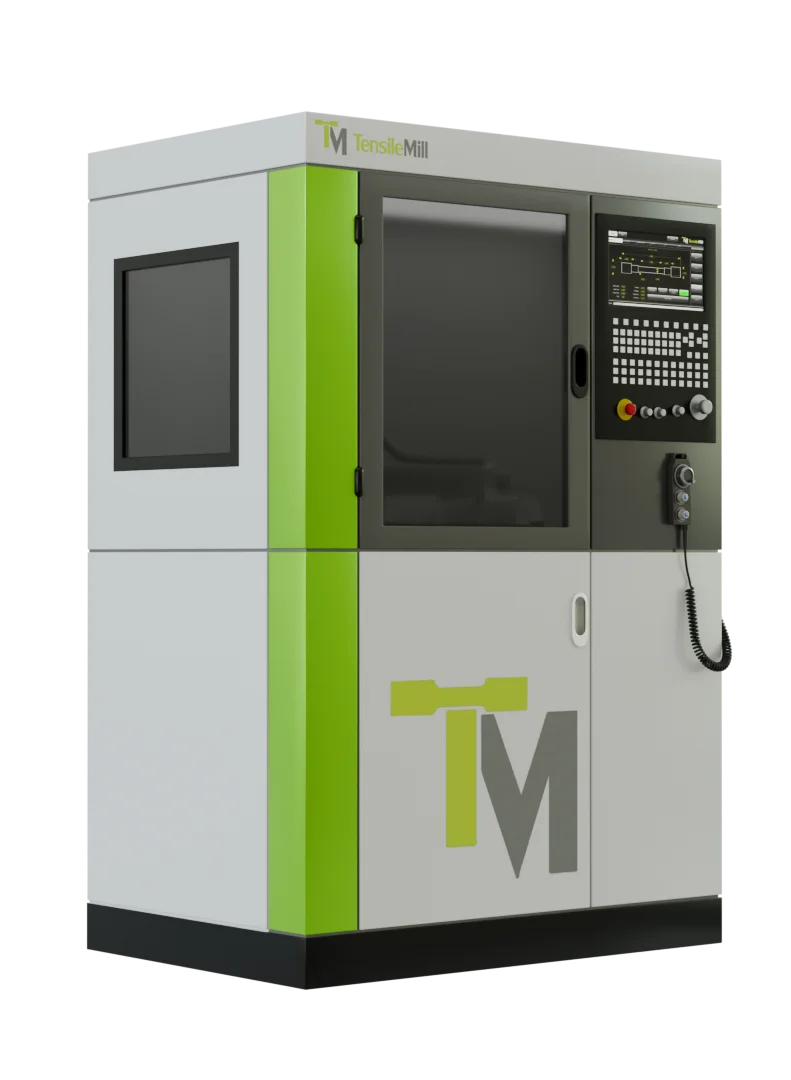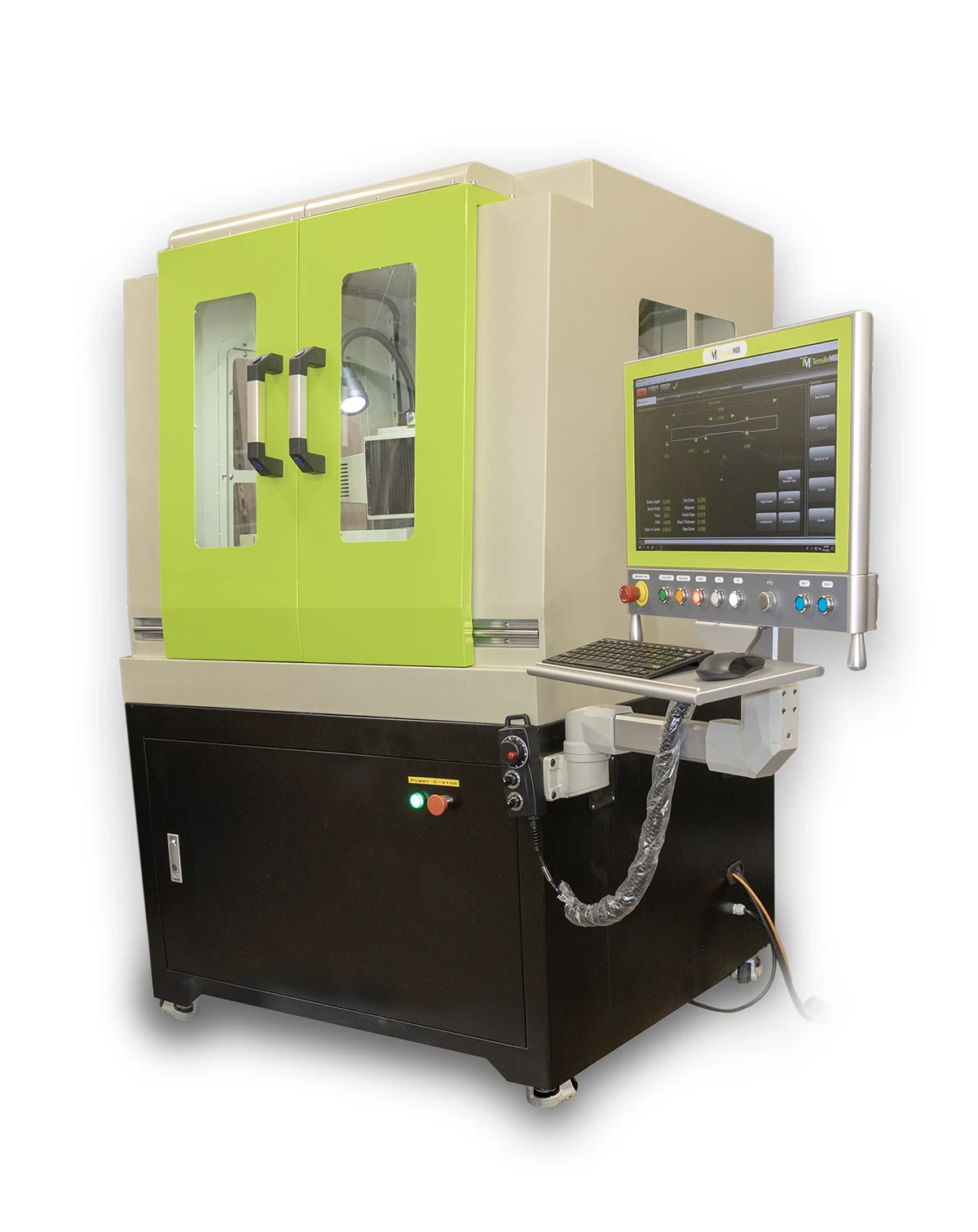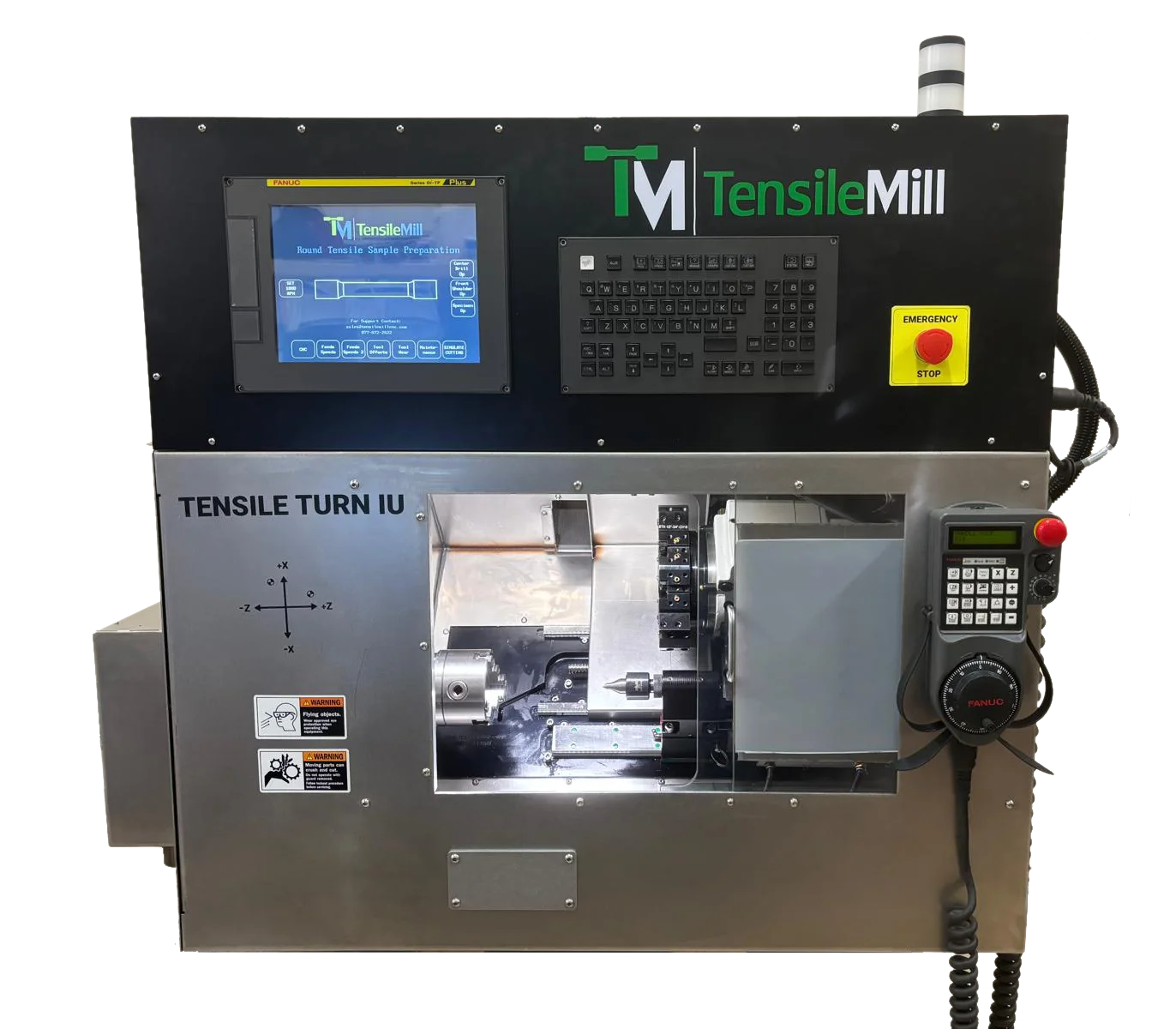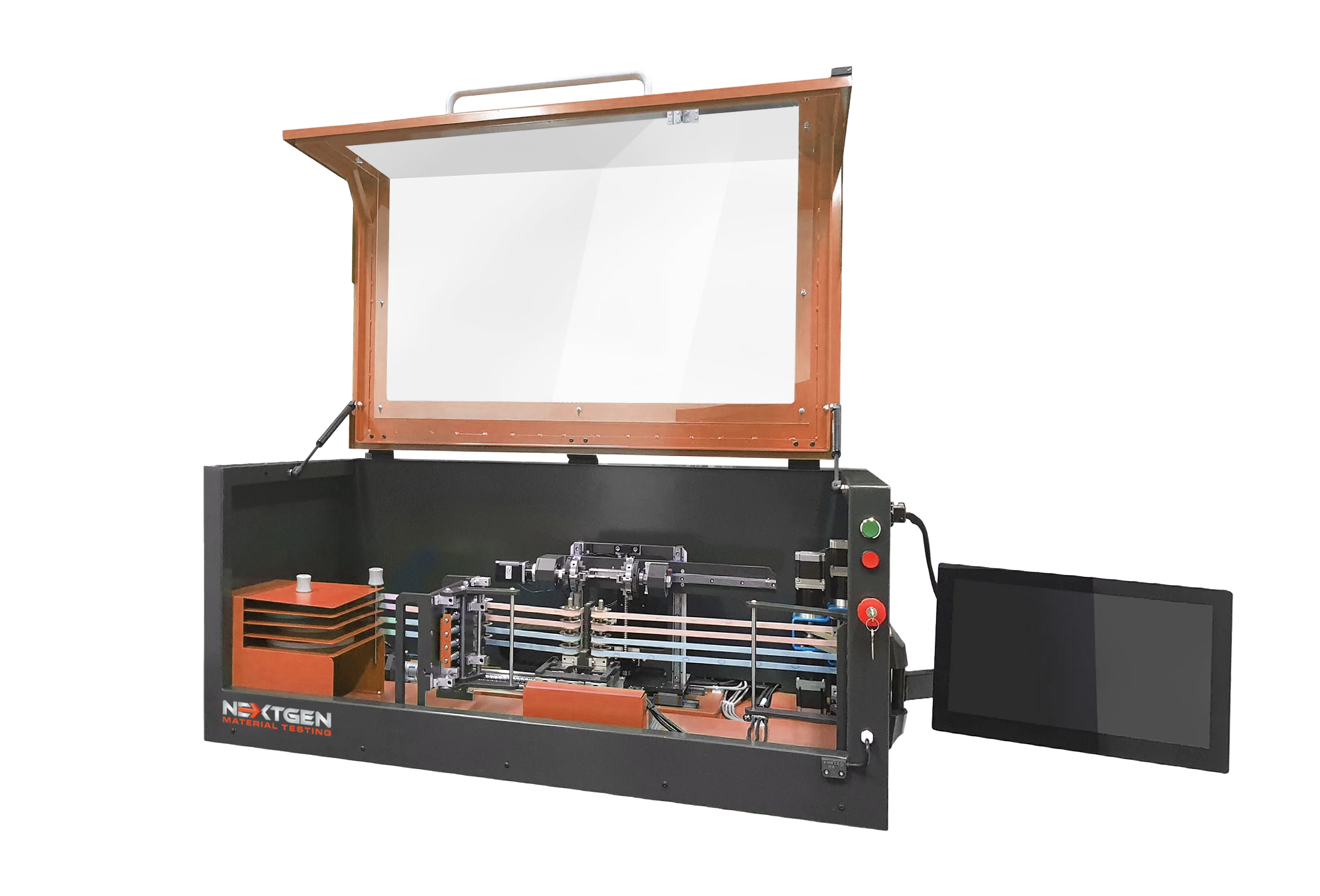
Metal Testing Equipment

NextGen Material Testing works in partnership with TensileMill CNC Inc., a company specializing in CNC solutions for preparing flat and round tensile specimens. This collaboration allows us to offer equipment that supports various levels of tensile specimen preparation — from routine QC checks and academic materials research to continuous production testing environments. The systems are designed to help users machine precise flat dog-bone specimens and round (cylindrical) tensile specimens according to widely used industry geometries and standards such as ASTM and ISO. Operators select the required dimensions, load the blank, and machine repeatable specimens with minimal setup time.
The equipment offered within this category spans multiple sizes, capacities, and workflow styles. Compact desktop units suit laboratories with lower to moderate sample volumes, while larger CNC platforms are designed for high-throughput environments where preparation speed, stable clamping, and consistent dimensional results are essential. This range makes it possible to select a system based on specimen geometry, material type, volume of testing, and available workspace.
Alongside our partnership systems, NextGen Material Testing also provides equipment to support the full preparation workflow. This includes surface finishing and polishing systems used to refine specimen quality after milling or turning steps. These additional solutions allow laboratories to configure a complete preparation sequence, from initial shaping to final finishing, based on their internal testing requirements and level of precision needed before tensile analysis.
Sub-categories

Flat Tensile Specimen Preparation Machines
This category focuses on equipment for preparing flat tensile specimens used in mechanical testing. These systems allow users to machine dog-bone shaped blanks in standardized dimensions for tensile testing, supporting workflows from research labs and universities to high-volume production testing. Different machine sizes and configurations are available to match material type, testing frequency, and workspace requirements.

Round Tensile Specimen Preparation Machines
This category includes equipment for preparing round tensile specimens used in mechanical testing. These systems shape raw bars or cut blanks to standard specimen dimensions with steady, repeatable geometry. Different machine sizes and configurations are available to support research laboratories, routine quality control, and high-volume production testing across various materials and workload levels.
Products

Automatic Longitudinal Polisher System for Tensile Specimens – NG-AutoPol
The NG-AutoPol Automatic Longitudinal Polisher System by NextGen Material Testing Inc. is engineered to minimize grinding stress and residual surface stress that often remain after initial machining operations such as turning or milling. This advanced machine delivers precise longitudinal polishing […]
FAQs
Flat tensile specimens (often prepared in a dog-bone profile) are used when the starting material is sheet-based or thin, such as rolled metal sheets, stamped panels, polymer sheets, or composite laminates. These specimens are typically shaped by milling to create a narrow gauge section for controlled deformation and wider gripping shoulders that fit securely into testing fixtures. Flat specimens are the preferred choice when the material thickness is limited and when the structure of the material is better represented in sheet form.
Round tensile specimens (also referred to as cylindrical tensile bars) are used when the material is supplied as bar stock, forged blanks, machined components, or other solid sections. These specimens are usually prepared by turning on a lathe to create a uniform diameter gauge section and smooth transitions toward the shoulders. This geometry supports even axial loading, which helps reduce bending effects and provides a more uniform stress distribution across the sample.
The choice between flat and round specimens generally depends on the initial form of the material and the type of mechanical behavior you need to observe. Flat samples are selected for thin or layered materials, while round samples are selected for thicker or solid materials where the full cross-sectional response is important. Both formats can be produced to match ASTM, ISO, DIN, or internal testing standards.
The choice usually comes down to how often you prepare specimens and what materials you work with. If you prepare only a few samples per day, or your testing is mainly for research, education, or small laboratory studies, a compact system is often sufficient. These machines require less space, are easier to learn, and handle moderate workloads comfortably.
If specimen preparation is part of daily quality control, or if you are working in a production or industrial environment, it is more practical to use a larger system designed for continuous operation. These machines handle heavier materials, support longer run cycles, and offer more stable output when throughput is an important factor. In simple terms: small systems work well for low-volume labs, while larger systems are better for facilities with regular or high-volume specimen preparation needs.
Yes. Tensile specimens can be prepared to match commonly used testing standards such as ASTM, ISO, and others. Most systems allow you to either select a predefined specimen geometry based on these standards or enter your own dimensions manually if your laboratory follows an internal procedure.
The key point is that the machine does not restrict you to one specific standard. As long as you know the required dimensions for the specimen, such as gauge length, width or diameter, and transition radii, the system can produce the sample to match those requirements. This flexibility allows the equipment to be used in research, quality control, and production environments where different standards may apply.
Not necessarily. Many tensile specimen preparation systems are built with guided interfaces that walk the operator through each step of the process. Instead of programming tool paths manually, the user typically enters the required specimen dimensions or selects them from a predefined list. The machine then handles the machining sequence on its own.
This approach is designed so that technicians, lab staff, or engineers without machining backgrounds can operate the equipment safely and consistently after a short orientation. Of course, having some familiarity with materials and basic handling always helps, but the workflow does not require traditional CNC skills or complex G-code programming.
Tensile specimens can be prepared from a range of engineering and structural materials, as long as the material can be shaped to a defined gauge section. This typically includes:
- Metals: steel, stainless steel, aluminum, copper alloys, titanium, nickel-based alloys
- Polymers: thermoplastics, thermosets, reinforced polymer sheets
- Composites: fiber laminates, carbon fiber plates, glass fiber reinforced materials
- Other solid materials used in mechanical testing research and production QC
The equipment is not limited to one material group. The main considerations are:
- thickness or diameter of the starting blank
- hardness and machinability of the material
- required testing standard or dimension set
Regular maintenance and calibration are key to keeping specimen-preparation equipment delivering consistent results over time. Many labs see shifts in dimensional accuracy or cycle times if maintenance is delayed or calibration is neglected. For example, in tensile-testing systems, calibration of load cells and alignment mechanisms is cited as critical to maintaining valid results.
Typical maintenance and calibration tasks include:
- cleaning and checking tooling and clamping fixtures for wear or damage
- verifying machine alignment, gauge-section tool paths and fixture centering
- checking spindle run-out or chuck concentricity if turning round specimens
- updating software or machine offsets after major material or geometry changes
- scheduling a full calibration of measurement-related components (especially if part of the machine feeds test frames) on a quarterly or annual basis depending on usage
Yes. At NextGen Material Testing, we provide complimentary sample preparation trials and live demonstrations to help clients evaluate how our equipment performs with their specific materials and testing requirements. These sessions allow laboratories to see the full workflow, from fixture setup and programming to the final prepared specimen, before making a purchasing decision.
Our process typically includes:
- Receiving a few raw samples from your material batch (metal, polymer, or composite)
- Preparing them using the appropriate flat or round tensile specimen preparation system
- Recording the machining process for reference and transparency
- Returning the finished specimens for inspection, along with a short process report
This approach gives your team a clear understanding of cycle time, precision, and surface quality achievable with our systems. If you would like to schedule a sample preparation trial or receive a live demonstration, please contact our team directly to arrange your session.